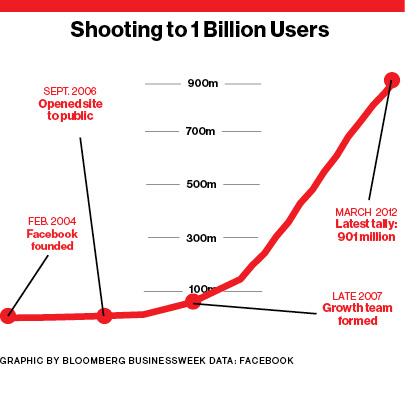Facebook is set to hit 1 billion users by the end of 2012. Growing this number is helped by a dedicated team that helps influence nearly every aspect of Facebook, and has grown from just five people to 150.
Central to this group is Naomi Gleit, product manager and the second-longest-tenured Facebook employee. Her goal is making “Facebook available to everyone in the world” as she describes.
Growing Facebook is perhaps more vital than ever, given some signs that expansion is slowing down and disappointing results from Facebook’s fiscal report. Since Facebook’s initial public offering in May, its shares have fallen more than 22 percent, to about $29 per share.
Gleit joined Facebook in early 2005 after writing a thesis on how Facebook beat out a rival website called Club Nexus on the Stanford campus, and after being turned down for a position as assistant to then-President Sean Parker, she eventually landed a job on the marketing team. “She wanted to work at Facebook more than anything,” says Matt Cohler, an early executive at the company who hired Gleit and is now a general partner at the venture capital firm Benchmark Capital.

Gleit pushed Facebook to expand beyond Ivy League schools to other colleges, followed by high schools, businesses, and, in 2006, to basically everyone. “My job has been, over the years, to remove barriers that are preventing people from joining Facebook,” says Gleit.
Gleit was the product management leader for the growth team when it was formed in 2007 because growth had cooled after reaching 100 million members. “She is someone that the engineers both tremendously respected and also feared,” says Palihapitiya, who left Facebook last year. “We used to call her ‘the Mom.'”
What helped the company expand was a deal with Google to show profiles in results and launching the “People You May Know” application. They later created a translation tool lets users in Spain, France, and Germany navigate the site in their native languages and within two years of its creation, the team had expanded Facebook’s roster of users sevenfold to 360 million.
Eventually, the goal of the GEM team (an acronym for growth, engagement, and mobile) was to keep existing members active and logging in from mobile devices.
Gleit wants to build “magic moments†in the site, and helped develop functions like the contact importer, which suggests friends based on names in a user’s e-mail address book. The next big opportunities are in emerging markets like India, where penetration still isn’t high for the site.
“There are still a lot of barriers in international markets, whether that be governmental barriers like in China, and occasionally Vietnam, or competitive barriers like VKontakte in Russia,” she says, referring to the Eastern European social network with more than 100 million users in that country.
Membership growth programs has become a mandatory part in many companies at Silicon Valley, with Quora, Dropbox, and Twitter all having their own now. While Facebook is staring down a billion users Gleit’s more interested in looking ahead. “1 billion is one-seventh of the world’s population,” she says.
Source: BusinessWeek.com

